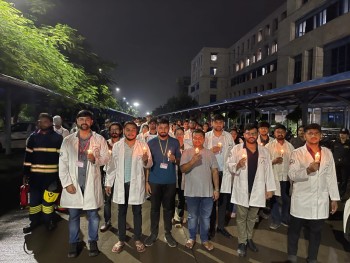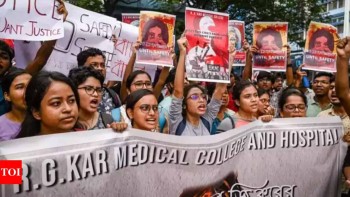The Universal Declaration of Human Rights (1948) emphasizes the fundamental dignity and equality of all human beings. Based on this concept, the notion of Patient Rights has been developed across the globe in the last few decades. There is a growing consensus at international level that all patients must enjoy certain basic rights. In other words, the patient is entitled to certain amount of protection to be ensured by physicians, healthcare providers and the State, which have been codified in various societies and countries in the form of Charters of Patient’s Rights. In
India, there are various legal provisions related to Patient’s Rights which are scattered across different legal documents e.g. The Constitution of India, Article 21, Indian Medical Council (Professional Conduct, Etiquette and Ethics) Regulations 2002; The Consumer Protection Act 1986; Drugs and Cosmetic Act 1940, Clinical Establishment Act 2010 and rules and standards framed therein; various judgments given by Hon’ble Supreme Court of India and decisions of the National Consumer Disputes Redressal Commission.
A lot has been done for the rights of patients but insignificant efforts have been made to protect rights of doctors and other healthcare workers.
In the noble pursuit of healing and caring for humanity, doctors and other healthcare workers (HCWs) stand as beacons of hope and compassion. Yet, despite their tireless efforts, they often face challenges and injustices that undermine their essential role in society. It is imperative to recognize and safeguard the rights of doctors and healthcare professionals, ensuring their safety, dignity, and professional autonomy.
Some of the fundamental rights of doctors and healthcare workers that must be upheld to foster a conducive environment for healthcare delivery:
1. Protection from Violence:
Every HCW deserves to perform their duties without fear of violence or harm. A robust central law is indispensable to prevent and deter acts of violence against doctors, nurses, and other healthcare staff.
2. Right to Refuse Treatment:
In instances where patients resort to violence against HCWs, healthcare professionals must have the right to refuse treatment, safeguarding their well-being and dignity.
3. Information Sharing:
Transparency is paramount. HCWs should have the right to share information about violent patients with their colleagues and professional associations to ensure collective awareness and safety.
4. Blacklisting of Violent Patients:
Similar to the aviation industry, there should be a provision to blacklist patients with a history of violence against HCWs. This measure would serve as a deterrent and protect healthcare professionals from potential harm.
5. Reimbursement for Emergency Treatment:
In cases where emergency patients refuse to pay hospital fees, the state should step in to reimburse the expenses incurred by healthcare facilities, ensuring fair compensation for their services.
6. Reimbursement for Unsettled Bills:
State governments must guarantee reimbursement for healthcare facilities if patients are released without settling their hospital bills, preventing financial burdens on institutions.
7. Streamlined Complaint Handling:
The proliferation of complaints across multiple fora (Consumer commissions,Civil courts,Criminal courts,Police,NMC/SMC etc) burdens doctors. There is a pressing need to streamline the complaint process to prevent duplicity and ensure fair and efficient resolution.
8. Penalty for False Complaints:
To deter false and frivolous complaints, provisions for penalties and the right to recover damages from patients must be instituted, safeguarding the reputation and integrity of healthcare professionals.In the CP Act2019 there is no provision of penalty against a false/frivilous complaint.
9. Protection from Mental Harassment:
Doctors should be shielded from mental harassment and defamation on social media platforms, preserving their mental well-being and professional standing.
10. Fee Autonomy:
The right to charge fees commensurate with experience and qualifications is essential. State intervention in fixing professional service fees must be prohibited to maintain fairness and autonomy.
11. Uniform Documentation:
Standardized formats for consent forms and other documents, endorsed by appropriate authorities, would ensure clarity and consistency in healthcare practices.
12. Protection from Unwarranted Prosecution:
Doctors should be protected from criminal prosecution when there is no evidence of malicious intent or deliberate wrongdoing, safeguarding them from undue legal burdens.
13. Compensation Capping:
To prevent exorbitant financial liabilities, there should be a reasonable cap on compensation awarded against doctors in consumer commissions, ensuring justice without undue financial strain.
14. Regulation of Resident Doctors' Working Hours:
Resident doctors play a crucial role in patient care, yet subjecting them to excessively long working hours compromises their well-being and jeopardizes patient safety. Implementing regulations to ensure reasonable working hours for resident doctors is imperative to safeguard their health and the quality of care they provide.
15. Affordability of Medical Education:
The escalating fees in medical colleges have transformed medical education into a commercial enterprise, posing barriers to aspiring healthcare professionals. Medical students must have the right to access affordable education in medical colleges, ensuring that financial constraints do not hinder their pursuit of a career in healthcare. By prioritizing affordability, we can nurture a diverse and inclusive healthcare workforce, enriching the fabric of our healthcare system and fostering equitable access to quality care for all.
16. Issue of bonds in medical colleges:
Bonds in medical colleges in India are a big concern that frequently spark discussion and worry among doctors, students, and policymakers. In the context of medical education, bonds are contracts that medical students, particularly those enrolled in postgraduate (PG) courses, sign committing them to work in particular locations or organizations for a predetermined amount of time after finishing their studies. Failure to fulfill the bond result in financial penalties. There are different types of bonds in India, including service bond, compulsory rural service bond, discontinue penalty bond and bank guarantee.
It is undeniable that the bond system in medical colleges has an adverse impact on medical students, both mentally and financially. The system which is restrictive for medical professionals, limiting their career choices and mobility and infringes on the professional autonomy of medical practitioners must end immediately.
In conclusion, the rights of doctors are not merely aspirational but imperative for the well-being of society as a whole. Upholding these rights is not only a matter of justice but also a testament to our commitment to nurturing a healthcare system founded on respect, dignity, and fairness. It is time to stand in solidarity with those who dedicate their lives to healing and championing the cause of healthcare workers' rights.











Recent comments
Latest Comments section by users
Guest
Apr 17, 2024
Violation should be highly punishable like court give claims on death of PT as more then twenty lac etc then only it will be controlled
Guest
Apr 17, 2024
Important recommendations , should work towards their implementation Rajveer Arya